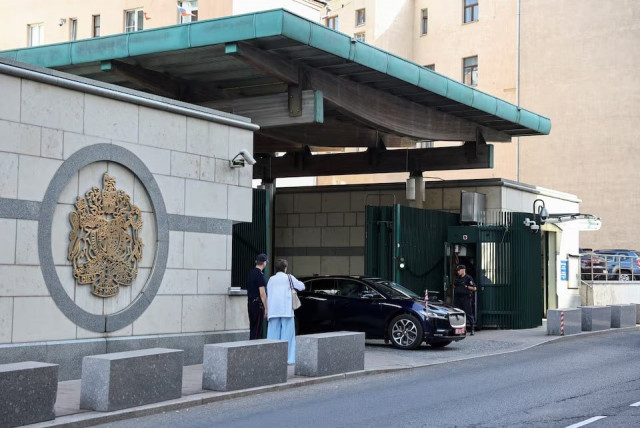Russia expels six British diplomats over espionage allegations
Move comes as UK leaders push for Ukraine’s use of long-range missiles against Russia, with Moscow alleging sabotage

Russia's Federal Security Service (FSB) announced on Friday that it had revoked the accreditation of six British diplomats in Moscow, accusing them of espionage and sabotage. The announcement reflects the Kremlin’s dissatisfaction with what it perceives as Britain’s significant role in aiding Ukraine during the ongoing conflict.
The British government, however, dismissed the accusations as "completely baseless," stating that Russia’s move was retaliatory. This follows the UK’s expulsion of the Russian defence attaché and the removal of diplomatic status from several Russian properties in May.
The timing of Russia’s announcement coincided with British Prime Minister Keir Starmer’s visit to the United States, where he met with President Joe Biden at the White House. The meeting was seen as a crucial step in securing approval for Ukraine to use long-range missiles against targets within Russia.
President Biden reiterated the US commitment to supporting Ukraine in its defence against Russian aggression. Although neither leader mentioned long-range missiles in their brief remarks to the press, it was clear that discussions on this matter were ongoing behind the scenes. The White House also confirmed that no new policy announcements regarding Ukraine were planned at the time.
Starmer emphasised the importance of continued Western support for Ukraine, stating that the coming weeks and months would be critical in the fight for freedom.
On the other hand, Russian President Vladimir Putin issued a stark warning on Thursday, stating that if the West allowed Ukraine to strike Russian territory with long-range Western-made missiles, it would escalate the conflict and change its nature. The Kremlin added on Friday that Putin’s message to the West had been clear and unmistakable.
The discussions on long-range missiles have gained urgency following reports of Iran supplying ballistic missiles to Russia, which are intended for use against Ukraine.
Both Russia and Iran have denied such transactions. Nevertheless, Western officials see this development as a significant escalation, leading to intensified talks on permitting Ukraine to utilise long-range missiles against Russian targets.
The FSB, which is the main successor to the Soviet-era KGB, claimed that it had uncovered evidence showing that a British Foreign Office department responsible for Eastern Europe and Central Asia was coordinating efforts to escalate the political and military situation in Ukraine.
According to the FSB, this department aimed to ensure Russia’s strategic defeat in its ongoing war with Ukraine. The FSB stated that the activities of British diplomats in Moscow threatened Russian national security.
In response, the FSB announced that, based on the documents it had obtained, it had recommended the termination of the accreditation of six members of the British Embassy’s political department. The Russian Ministry of Foreign Affairs, in cooperation with other agencies, acted on this recommendation, accusing the diplomats of engaging in espionage and sabotage activities.
Despite these serious allegations, Britain remained firm, with a spokesperson from the British Foreign Office reiterating that the accusations were without merit and asserting that the UK would continue to protect its national interests unapologetically.
This diplomatic incident escalates the already strained relations between Russia and the UK, especially as Starmer arrived in Washington for discussions about allowing Ukraine to use Britain’s Storm Shadow missiles, which have a range of over 250 kilometres, against targets in Russia.
Ukrainian President Volodymyr Zelenskiy has been advocating for access to these types of long-range missiles for months, as they would enable Ukraine to strike deeper into Russian territory. While the UK and the U.S. have been cautious in providing weapons that could be used within Russia, sources indicated that the ongoing talks were progressing, and a decision might be announced during the United Nations General Assembly later in September.
Despite speculation, White House spokesperson John Kirby downplayed the likelihood of a major shift in U.S. policy on this issue, stating that there were no immediate plans to change the current stance on providing long-range strike capabilities to Ukraine for use inside Russia. He reiterated that any significant policy announcements were unlikely to emerge from the discussions between Biden and Starmer.
Further complicating matters, Russian state television named the six expelled British diplomats and released surveillance footage of their activities in Moscow. The footage included covert recordings of one diplomat meeting an unknown individual, which the FSB claimed demonstrated intelligence-gathering activities. An anonymous FSB official, whose identity was concealed during a broadcast on the Rossiya-24 state TV channel, remarked that Britain had ignored previous warnings about its diplomats’ activities in Russia, prompting the decision to expel the six diplomats as a starting point.
The FSB warned that other British diplomats would be sent home early if they were found engaging in similar behaviour. The Izvestia newspaper cited FSB sources, alleging that the expelled British diplomats had been involved in recruiting Russian teenagers, orchestrating provocations, and holding discussions with opposition figures at the British ambassador’s residence in Moscow.
The FSB also accused British diplomats of working with Russian activists to create divisions within the country’s society, particularly by exploiting ethnic and migrant tensions. Furthermore, it suggested that many individuals involved in Britain’s work on Ukraine, based in London and Kyiv, were affiliated with the MI6 intelligence service, though it provided no concrete evidence to support these claims.
Russian Foreign Ministry spokeswoman Maria Zakharova added fuel to the fire by claiming that the activities of the British embassy in Moscow had violated diplomatic norms, specifically the Vienna Conventions. She argued that the diplomats’ actions went beyond formal protocol violations and amounted to subversive activities designed to harm the Russian population. Zakharova’s comments, shared on Telegram, further underlined Russia’s growing frustration with Western interference in its domestic affairs.
The expulsion of the British diplomats is the latest development in the ongoing geopolitical struggle between Russia and the West, with Ukraine at the centre of the conflict. As diplomatic tensions continue to rise, the prospect of Western-made long-range missiles being used against Russia adds yet another layer of complexity to an already volatile situation.



















COMMENTS
Comments are moderated and generally will be posted if they are on-topic and not abusive.
For more information, please see our Comments FAQ